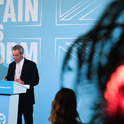Commercial television is suffering a cataclysmic fall in advertising revenues. Yet the BBC receives more from its licence fee than all the revenues of commercial television put together. In the last (mild) advertising downturn in 2002, Mark Thompson was the chief executive of Channel 4 and described the BBC as wallowing in "a jacuzzi of cash." Now Thompson runs the BBC and the jacuzzi has become a luxuriant Turkish bath. We should look more critically than ever at how the BBC spends its money. But now and again a programme comes along that reminds us why we pay the licence fee. Iran and the West (BBC2), from the independent production company Brook Lapping, was one such series.
Shown over three Saturdays in February, Iran and the West was produced by Norma Percy and, like previous productions of hers, gets the people who participated in pivotal world events to tell their own stories. Most of them trust the BBC and Percy enough to talk in detail for the first time. It takes enormous effort to persuade and record them, then months to edit the interviews. Only the BBC is currently able to devote the resources necessary for projects like this.
The 30-year sweep of Iran and the West is breathtaking. It starts with the revolution that swept Khomeini to power and has a chilling clip of him saying, "I will decide the government—a government for the people." We get the inside story of how the US embassy hostage crisis was used to humiliate President Carter, the export of revolutionary guards to Lebanon to found Hizbullah, and the first Gulf war. Before long the moderate Khatami becomes president of Iran and Jack Straw, Britain's foreign secretary, remonstrates with him for the words painted on the missiles paraded in Tehran: "Death to America!" The president replies that this is an improvement on what the hardliners would prefer: "Death to Khatami!" Straw also features in the funniest of the archive clips. He and Condoleezza Rice are visiting Iraq. She emerges first from the plane. Straw follows wearing a massive helmet which he removes when he realises that Rice, who is unprotected, is making him look ridiculous.

Iran and the West has a nice line in revelations. One is that Ahmadinejad, as a student leader in 1979, opposed the plot to capture the US diplomats in the American embassy. He thought that Russia and communism were the real threat to the revolution. It becomes clear that Tony Blair almost certainly sacked Straw as foreign secretary because the Americans thought he was too soft on the Iranians. We're reminded of the deeply ironic episode in which the Taliban captured and executed Iranian diplomats in Afghanistan. And most shocking of all is the Iranian allegation that Chirac's Gaullists, seeking to win the 1986 French general election, asked the Iranians to ensure that French hostages in Lebanon stayed in captivity until after the French voted. Thus, it's said, they denied Mitterrand and his socialists the credit for the hostages' return.
But we should not claim too much for this series. Television is a brilliant medium of emotion, but not of profound analysis. It seeks simplicity and favours personalities over policy. Percy knows this and makes sure the series has a human narrative. But do not look for a discussion of whether Khomeini and his allies were driven by Islamicism, nationalism or simple egomania, or of why the Sunnis hate Shias, or of whether the brutality of the revolution accorded with the dictates of the Koran. Nor are there reflections on how the west has backed leaders, such as Saddam Hussein, who later slip the leash, fortified by our aid and arms.
Iran and the West shows us history repeating itself. We see George Bush Snr in his 1989 inaugural speech making overtures: "Goodwill begets goodwill." Twenty years later Barack Obama has just offered this message at his inauguration: "We will extend a hand if you are willing to unclench your fist." So now Obama's secretary of state, Hillary Clinton, sets forth to build bridges with the Iranians once more. We can look forward to Norma Percy revealing what she really gets up to in due course.











